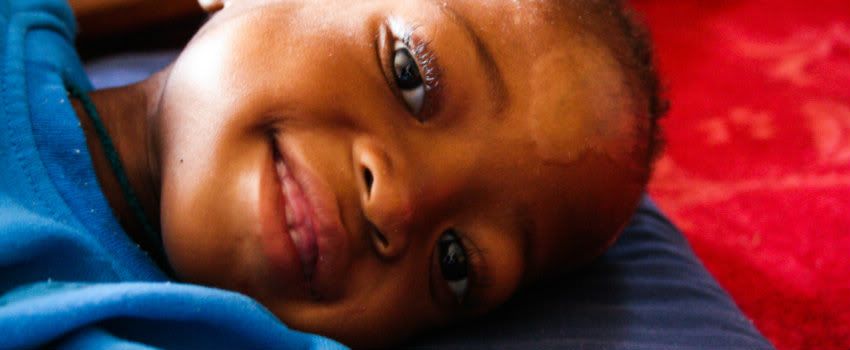I had never given much thought to tuberculosis before coming to Mokhotlong. While it is indeed a lingering threat in the United States, it often flies under the radar. Out of sight, out of mind, I suppose.
Here, TB is a large enough problem that it is front and center in most medical providers' minds, right up there with HIV and malnutrition. It is also a common threat to our young clients' health, whether they are infected themselves or someone else in their household is infected. Small, smokey, one-room rondavals in which everyone in the family sleeps and breaths and coughs together aren't exactly the best place to spend a night with someone with TB. There is a section of Mokhotlong Hospital next door devoted to patients with multiple-drug-resistant TB. Our outreach teams ask questions about TB history within the household each time they fill out a new client intake form and each time they perform a monthly client check up.
In the World Health Organization's standards for defining symptomatic HIV infection, tuberculosis is considered one of only four "major signs" of infection. Co-infection of the two diseases means a dire outlook for a patient, especially in a place like Mokhotlong. Already compromised immunologically by the HIV, such patients have an extremely tough time fighting their TB and few resources to aid them in that fight.
On Wednesday morning, I happened to be in M'e Nthabeleng's office as she was checking TTL's email account, which is provided by our Lesotho-based Leo Internet Provider. The company has a homepage where they post country news, and the headline that popped up on Nthabeleng's computer caught my eye.
"HIV, TB cut Lesotho life expectancy to a mere 36."
"Woooh!" Nthabeleng said. "That is all you get in Lesotho."
Even though I've become accustomed to stark and shocking statistics in this country, particularly the sky-high statistics on HIV infection among people in my own age group, the final age of 36 jumped out at me as being particularly devastating. I immediately thought of all I still want to do in life -- I'm 24 -- and what dying in just 12 years would mean. More important, I thought of what that statistic would mean to me if I were a Mosotho, how it would affect my ambition, my drive, my optimism, and how it would inevitably mean a long line of my loved ones would die young even if I weren't infected myself.
Turns out the article -- the original source of which I am unsure of -- was posted in light of the fact that Wednesday was World TB Day. As such days are aimed at spreading awareness, I figured I would share my above thoughts on TB in Mokhotlong, as well as the article in its entirety below:
HIV, TB cut Lesotho life expectancy to a mere 36
March 24
Medical workers are increasingly concerned that the lethal combination of HIV infection and tuberculosis may become the world's next major health crisis.
To mark World TB Day on Wednesday, Medecins Sans Frontieres drew attention to Lesotho, which has the world's third-highest prevalence of HIV, the virus that causes AIDS, and the fourth-highest prevalence of tuberculosis. Here, poverty and violence complicate treatment in a country where life expectancy is a mere 36 years.
Michael Sidibe, head of the U.N. AIDS program, fears the double infection could become the next new epidemic.
"I'm calling for serious attention to TB, and serious attention to TB-HIV co-infection," he said in an interview.
In this mountainous kingdom surrounded by South Africa, some patients battling HIV and tuberculosis must walk five hours to reach a clinic for their medication.
"It is a problem for us to come to the clinic because sometimes there are gangster men waiting down by the side of the river … and yes, sometimes women are raped," said Tlalane Tsiane, a 21-year-old woman infected with TB and HIV.
Many men in Lesotho travel to South Africa to work in the mines and some return with HIV and a form of tuberculosis that is resistant to multiple antibiotics. The World Health Organization believes drug-resistant strains present a major challenge to the global effort to control the disease.
Helen Bygrave, a medical coordinator for Medecins Sans Frontieres, also known as Doctors Without Borders, estimated that between 80 and 90 percent of Lesotho's TB patients are infected with HIV.
A person whose immune system is compromised by HIV is particularly susceptible to tuberculosis, which is caused by bacteria that usually attack the lungs. The disease is spread through the air when an infected person coughs or sneezes.
There are nearly 9 million new cases of TB worldwide and the disease kills more than 1.5 million people every year, according to the World Health Organization, even though it can be cured with a six-month course of antibiotics that costs only $20.
Sera Thoola, a retired miner of 47, believes that he contracted TB in South Africa. It is also where he first tested positive for HIV. He has multiple-drug-resistant TB, and is currently taking an average of 49 pills a day to control his diseases.
Most clinics in Lesotho were set up through partnerships between the government and international groups. In seeking ways to make the most of the scarce resources, Medicins Sans Frontieres is helping to support and run a program in which nurses are given training to take on roles doctors might have carried out. Community health workers later make sure patients are sticking to their treatment regime.


No comments:
Post a Comment